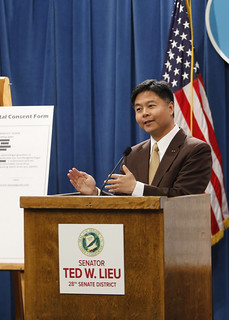 Senator backs down from car tax discussion
Senator backs down from car tax discussion
by Brian Leubitz
If you ever wonder about the gaping hole in our budget that we’ve been trying to close for the last decade or so, there is one part of that larger pie that is bigger than the rest. That is the Vehicle License Fee. Back when Arnold Schwarzenegger was running in the recall election, it was dubbed simply the “car tax.”
And give him credit for this, when elected he did, in fact, slash the “car tax.” We were able to backfill with a few years of budgetary “smoke and mirrors” but the hole was stubborn. And when 2007-8’s big recession hit, we were proverbial budgetary roadkill. The cuts just couldn’t come fast enough to match the speed of declining revenue, given that we had already made cuts to cover the loss of the VLF revenue.
And so here we stand, with a brand new legislative supermajority sure to eventually show up. So, given the damage the VLF cut brought us, surely it would be at least open for discussion, right? Sen. Lieu thinks so, or at least he thought so a few days ago when he told the LA Daily News just that
The constitutional amendment would restore the 2 percent vehicle license fee slashed by Gov. Arnold Schwarzenegger after he won office partly on that pledge.
The 1.35 percent transportation system user fee increase would generate an estimated $3.5 billion to $4 billion annually for roads and public transit in yet-to-be-decided proportions, Lieu said. … “It would be a test to see what the two-thirds (majority) Legislature means,” Lieu told the editorial board of the Los Angeles News Group. “The best way for us to lose the supermajority is to overreach.
“I’m not saying it would be an easy sell,” he added of the proposal. “I’m aware of the fact I may be attacked for it.” (LA Daily News)
Now, the interesting part here is that the suggested increase would still go to the voters, because, apparently we are all in on the government by plebiscite thing. All this would do is to save somebody a few million dollars of getting the measure on the ballot. To be honest, the amount of money spent getting it on the ballot would pale in comparison to the amount required to pass it. So, yes, Democrats have a supermajority, but no, they won’t be going so far as just passing additional revenues on their own.
Silly you, thinking we had a representative democracy, but even the vote was too much for some.
However, over the last few weeks California’s political landscape has changed. I have listened carefully to those who have contacted my office or me. Additionally, more stakeholders weighed in on this important issue. As a result, I will not be introducing the proposal. Instead, I will work with transportation stakeholders and the public next year on alternative ways to mitigate the transportation infrastructure problem. This problem is not going to go away and will only worsen when the final installment of depleted Proposition 1B funds are allocated next year. I am open to any suggestions and if you have any, please feel free to contact me or my office. – Sen. Ted Lieu
So the good senator got some pressure, and as Dan Walters points out they are loathe to be seen as “over-reaching.” The CW apparently comes down hard, and despite some solid advice from our very own Robert Cruickshank to move forward on progressive legislation, it looks like there is more work to be done here. Now, that being said, it looks like we may get some not inconsequential reform on the ballot in 2014, but the status quo is still quite strong.


